- Home
- Susan Hill
The Travelling Bag Page 6
The Travelling Bag Read online
Page 6
Someone called his name.
Mrs Mills came after a few minutes, knelt down and talked to him, though he did not speak. He could not. In the end, she helped him up and took him away.
Three
I remember very little about that time. I am told that I did not speak for almost a year. I know I went to a clinic and that various people talked to me and tried to help. I know that I was taken away from Hesterly at the end of that term and was sent to a special school in Wales. I don’t remember very much about what it was like there but I remember purple and grey mountains in the distance and a lake that seemed to stretch forever. I remember that it seemed easiest not to talk. There was nothing to say and I did not have any answers to their questions.
My parents were no longer together and I spent most time with my mother, whose eyes always seemed blank, and who lived as if she were muffled in blankets. I spent a lot of time alone, which I did not mind. I think I was just waiting.
But neither of them came back.
I never went to my uncle’s place again. I was told that he had died and the house was sold.
I suppose the years passed and I grew up.
It is a long time ago. I live alone. I am better that way. My quiet job makes me feel safe, though I find the travelling difficult.
I draw maps. I invent countries and their histories, as I did with Andreas.
I had not thought about any of it for a long time, because I have found it better not to delve into the past. It upsets me.
And then I read in the newspaper about Cloten Hall.
I cannot sleep. I want to know what happened to him, where he was when the fire broke out, if he was saved, if he … if …
I want more than anything to go there and see for myself. I might be able to find him. I might rescue him. He might follow me, as he did onto the coach. The Extra Boy. Boy Twenty-One.
ALICE BAKER
Promises had been made for years that we would not have to put up with our cramped, dingy old offices for much longer but would be moving to new ones ‘any day’. These would be spacious, light, quiet, and airy. We were even shown plans and given a presentation, with photographs, of the sort of building that would house us.
Nothing ever happened. Some people got tired of spending their working days in inadequately lit rooms, with their desks pressed too close to a wall or to that of another person, and they left. But others soon took their places, glad of the jobs, and having been spun stories about how they would only be working in this old building for a short time.
There were twelve of us when the new girl arrived. We had long made a pact that we would never reveal what we were sure was the true situation about the offices. It would be unfair to prick someone’s happy balloon at the start, and besides, what did we actually know? So we smiled and nodded and kept our mouths shut. Otherwise, we were an amiable, easy-going bunch, good about contributing to the pool that provided cake on Friday afternoons and topping it up generously for birthdays. We chatted but not too much, and we never gossiped about one another, though we certainly told the tale about the bosses, and those who worked in the adjacent and upstairs rooms. We always took it in turns to help a new arrival, show them where everything was, teach them the vagaries of the photocopier, and demonstrate the trick of how to turn on the hot tap in the loo.
This season’s new girl was called Alice Baker and she had already arrived when we got into work at nine o’clock. She was alone in the office, standing looking out of the window. When the first three of us piled in through the door, she turned and did not so much look at us as look us over, without any embarrassment. She seemed quite self-possessed – even oddly at home, as though she was perfectly familiar with the room and everything in it – including us.
It was April and the heating had been turned off but the office could still be chilly. Alice Baker wore a neat blue cotton frock, patterned with sprigs of small white flowers. She had neat hair, pulled off her face and coiled at the back. Neat Mary Jane shoes. I noticed straight away how small her feet were. Small feet and small hands.
‘Good morning. I’m starting today.’
Her voice was pleasant, quiet but not whispery, and she had no accent of any sort.
After that, it was introductions, the section manager coming in and briefing her about this and that, which he would already have done when she was hired – but Malcolm liked to show that he was in charge. When he had gone, we told her what we thought she needed to know, said she should ask any of us if she had a problem – and settled down at our desks.
She had been given one at the back, beside the door – not a good place, because there was always a draught as people came and went, and when anyone walked down the corridor the desk shook. But it was the traditional place for a newcomer. If they were lucky, someone would leave and they could move, the place by the door being taken by the next newcomer. None of them dared to complain.
Our lunch hour was from half past twelve and most of us brought in sandwiches and we ate together, turning our chairs round to form a group. Sometimes, one or two people went out, to the Greek Cypriot café in the next street, where they served good soup and a dish of the day, which was almost always moussaka, but the queue was long from noon, and you could waste your break time standing in it.
Alice Baker settled down to work and hardly lifted her head at all that first morning. It was as if she had known everything for months, and had no queries. But three times, she got up and tried to wedge the door so that it stayed properly closed after someone had come through it. The third time, she looked over at Wendy.
‘This is really annoying. Can no one do anything?’
The room went silent for a moment.
‘Not really,’ said Wendy, a girl who had never been disliked by anyone. ‘It’s the door. Everybody’s tried – I’m afraid this ancient building is the real problem.’
‘And two keys are sticking on my machine.’
‘Here, let me …’
Dilys was another helpful one – actually, now I think of it, everybody in the room was like that. We just got on with one another and got on with the work.
I happened to glance as Dilys bent over Alice Baker’s keyboard and as she did so, I saw a strange expression cross her face. It was not dislike but a sort of distaste. But then she went back to fiddling with the keyboard, and by the time she had finished her expression was normal and pleasant again.
‘That’s another thing,’ she said, walking back to her own desk, ‘We’re always being told we’ll be given brand new machines when we move into these amazing new offices. Anyway, that should be OK for now.’
Alice Baker did not say thank you, merely nodded, and I thought her expression was strange, too, mostly because it was not an expression at all. She looked simply blank.
The old-fashioned building had one good feature, a leftover from better days, and that was the tea trolley, which came round every morning at eleven o’clock and every afternoon at three-thirty, laden with cakes, buns and biscuits, as well as drinks. On Alice Baker’s first day, when the bell rang in the corridor, she jumped and asked in quite a panicky voice if that was the fire alarm. She was even standing up, as if she was ready to run. Christine explained, as we all started looking for handbags and purses.
‘And you have to be smart because there’s a queue and all the best cakes will have gone.’
At the end of the afternoon, some people would be straight out of the door, others would linger, chatting and gathering their things before leaving in twos and threes. There was a lift, a creaking lumbering thing whose ropes you could watch as they slid up and down like snakes, and whose light was usually out, so that you went down in pitch darkness, praying it didn’t stop between landings, or plunge to the bottom of the shaft. Not a lot of people used it.
Today, Alice was first to pick up her bag, and go. She did not look or speak to anyone.
‘Probably got a man waiting outside,’ Sandra said.
‘I doubt it.�
�
‘Why? Anyway, she’s OK, quite nice really. Not easy coming in when we all know each other.’
‘She certainly works hard.’
Jackets went on, scarves round necks, mirrors out to check lipstick and eye shadow.
‘I think we’re all agreed aren’t we? Good new member of the team?’
Dilys, patting powder on her face, tying her silk scarf in a careful knot, did not reply.
‘What’s wrong?’
‘There’s just – something about her.’
We went down the stairs together. I said, ‘I’ve known you get “feelings” about people before. So what was it?’
‘It was when I bent over to help her with the keyboard …’
‘What?’
She stopped and looked as if she was about to say something, but then thought better of it and just ran on ahead of me and out of the front door.
Alice Baker said little, worked hard and left the moment the clock struck five. I think most of us liked her well enough, in so far as we knew her. When it was someone’s birthday, she chipped in willingly for the usual cake and modest present. It was only odd that when Margaret asked when her birthday was, so that she could put her in the calendar, she twice seemed not to hear – at least, she did not volunteer a date. Only Dilys still did not care for her, though she never said anything nasty. But one day, when she and I went down to the bus stop together, I asked her what it was about Alice that she disliked.
‘I don’t dislike her. There’s just something a bit off-putting. Look at that coat in Marshall’s window! Not sure it’s my colour though, but it would suit you.’
‘What do you mean by “off-putting”? Don’t change the subject.’
Dilys looked at me and her expression was – I’m not sure how to describe it exactly, but the word ‘uneasy’ seems to fit.
‘Have you been close to her?’
I said that as my desk was on the other side of the room, I had not, except maybe in the tea trolley queue and even then I didn’t recall it. ‘Why?’
‘I wish that bus would hurry. I’m cold.’
It was not a cold afternoon, so she was clearly just trying to change the subject again. I just stared her out.
‘All right … there’s an odd smell around her.’
‘What, you mean a BO smell?’
‘No. I don’t know what it is but it’s very off-putting. Like I said.’
‘Has anyone else noticed it?’
‘I don’t know.’
‘Maybe something on her clothes.’
‘Maybe.’ But she looked doubtful. ‘The smell hovers around her though. Still, I went to the stationary cupboard directly after her yesterday and I didn’t notice anything at all then.’
‘There you are – it was probably something she was wearing one day and not the next. You know how you can get an awful smell from some fabric if it gets even a bit damp.’
‘Thank goodness for that, the bus at last.’
So I let the subject drop when we got to our seats.
The following day, I made it my business to go close to Alice Baker’s desk, putting my hand on the door handle as if to go out, and then hesitating for a moment. I even leaned in slightly, making her glance up. She said nothing, and there was no smell of any kind around her.
And so the office days went on as usual until, one Friday evening a month later, my phone rang just after eight-thirty. It was Brenda, the office coordinator, to say that she felt unwell and had left an important file at work, one that she needed to read and report on by first thing the following Monday. Brenda lived a few streets from me and of course I said that I would fetch it.
‘I’ll leave my set of master keys in the milk box. I don’t want you to come in and catch any germs from me.’
The old building was in a side street near the canal – once, I think there were wharves and warehouses, when the canal had brought barges carrying coal and pig iron and other goods into the heart of the city. They were long gone of course, though further out, where the canal flowed into the country, holiday boats chugged slowly up and down during the spring and summer, but none of these ever came into the city. Why would they? It was dirty and derelict down here, empty apart from a couple of office buildings like ours, and a few cafés and corner shops in the adjacent streets. Rubbish blew up and piled into the gutters, and oil and mud left a slick on the surface of the black canal water. The pubs had long gone.
I had taken Don’s car, and I drove down the narrow street and stopped right outside the front door. The evening was drawing in and the last rays of the sun were setting behind the tower blocks on the skyline. Once, these old black roofs had been the highest in the city.
There was a low-wattage overhead bulb above the front door and another inside the hall, both of which were lit, but otherwise I had to press the switches as I went up. I had never been inside the building after hours, and certainly not alone. There were shadows and dark corners, and I did not attempt to use the black hole of a lift. But I was not alarmed by hearing only my own footsteps going up the stairs, nor by the strange quietness of a building usually full of people.
I reached the first landing. Closed doors on either side. I stopped. I had not heard or seen anything and I was not frightened of being here by myself. But something was troubling me and, after a moment, it began to take over both my mind and body and all of my senses. I felt as if I were dissolving, or perhaps shrivelling. I was not faint or light-headed. I had a feeling that I was decaying. It is the only way I can describe it. I was becoming old and I was dying, slowly. Oxygen was giving out, though I could still just breathe, but when I did, the air smelled noxious. I had a sensation of creeping flesh and of things squirming beneath my feet. Everything was being absorbed into this horrible disintegration – the walls and stairs, the doors and the ceiling, the light fittings, the floor. And my own body. There seemed to be not only no clean air but no hope, no future, nothing joyous or pleasant left in existence. I was becoming mould. I looked at the backs of my hands and they were a greenish-white, with a bloom like the surface of mushrooms which have begun to turn. It was a terrifying, horrible sensation, and I could not get away from it or struggle out of it. How long I stood on the stairs in its grip I do not know – it felt like eternity but I actually think it was only a fleeting second. Time had expanded and contracted and I was totally confused.
And then I came to, like a diver surfacing from black, greasy depths. I was not in the sunlight or the clear crystal air but just where I had been, on the staircase in the empty office block, Brenda’s keys in my hand.
I took a cautious step up, and another. The whole sensation had left me. I felt normal. Solid. Dull. Human.
I was passing our own office, when I hesitated. It should have been in complete darkness but there was a faint glimmer coming from under the door, not so much a light as a phosphorescence, but as I stared, it faded – or rather, it did not exactly fade or grow dimmer. It was simply no longer there.
When I reached the top of the next flight of stairs, I stopped dead. Ahead of me was a short corridor, with management offices on either side, and ending in a blank wall. The wall was not dark, as it should have been, but seemed to be lit from above. And it was not blank. A shadow was visible against it, entirely unmoving, like a cut-out silhouette. Someone was in the building with me. But the shadow did not flicker and the silence was so deep it was as if my ears had been stuffed with felt.
I found Brenda’s office and went in, and I did not turn my back to the door as I looked for the file but went into the empty room sideways, looking behind me.
Nothing happened.
My own footsteps echoed through the building as I ran down the stairs. The gleam under the door of my own office was there again and stronger, a white light with a faintly greenish tinge. And now, there was a faint sound from inside. My mouth went dry. I had no reason to go into the office. I had the file Brenda needed. I could leave the building quickly, lock the door and d
rive away. I hesitated, bending slightly towards the door. Nothing. The light had gone again. I had imagined all this.
I think of myself as a strong person, and now, perhaps foolishly, I challenged myself to check that there was no one in our own office. I put my hand out and it seemed that before I had even touched the handle, the door fell open suddenly, so that I only just saved myself from falling inwards.
Alice Baker stood there. Her expression was odd, not startled or guilty at being caught where she had no reason or right to be, at this time in the evening, but as I remembered it the day she had arrived – blank. Her eyes were not focused on me, or on anything in the office, nor even on something distant, or in her own thoughts. It was as if they were focused on – nothing at all. She stared at me for a second, and then smiled quite calmly.
‘Hello.’
‘Alice? What are you doing?’
She did not reply. ‘Come on, I’ll let us both out.’
I waited. And as I waited, I felt as if my skin and then my flesh were growing cold and damp: it was like, but not exactly like, having a sweat. I dared not touch any part of me with any other part – put my hand to my brow, for example, because I was sure that if I did I would feel – this is horrible – my flesh flake and crumble away from my bones. A weight seemed to be pressing down on me, growing heavier and heavier, suffocating me. The office had gone. I was standing in darkness. I could sense Alice Baker’s presence but I could not see her. I smelled her though, a smell of mould and rottenness and decay, as if I had stumbled into an ancient cellar.
And then the sensation was gone and I was standing in the office, holding Brenda’s file. From outside, I heard a church clock strike nine.
Alice Baker was no longer there.
The following day, I went in early. I needed to go up the stairs and into our office before the place filled up. I was in there for twenty minutes alone and there was nothing. No smell, no greenish light, no sense of anyone else in the room.
I had taken the file straight to Brenda’s house the previous night, and as I drove home, I felt perfectly normal, though perhaps a little odd, as one feels on waking suddenly from an unpleasant dream. But the sensation faded and by the time I went to bed, it had shredded away and dissolved so that I could barely recall what had happened. If it had happened.

 Mrs De Winter
Mrs De Winter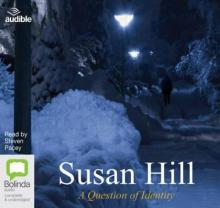 A Question of Identity
A Question of Identity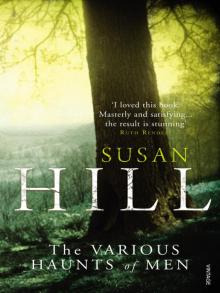 The Various Haunts of Men
The Various Haunts of Men The Pure in Heart
The Pure in Heart Printer's Devil Court
Printer's Devil Court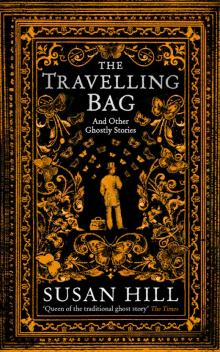 The Travelling Bag
The Travelling Bag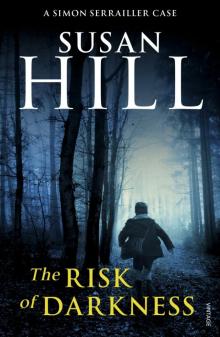 The Risk of Darkness
The Risk of Darkness A Kind Man
A Kind Man Black Sheep
Black Sheep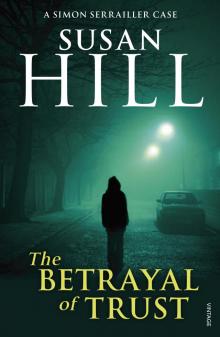 The Betrayal of Trust
The Betrayal of Trust The Service of Clouds
The Service of Clouds Betrayal of Trust
Betrayal of Trust The Small Hand
The Small Hand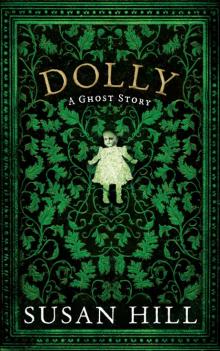 Dolly
Dolly Jacob's Room Is Full of Books: A Year of Reading
Jacob's Room Is Full of Books: A Year of Reading The Vows of Silence
The Vows of Silence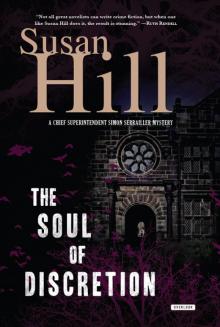 The Soul of Discretion
The Soul of Discretion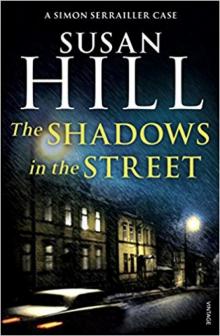 The Shadows in the Street
The Shadows in the Street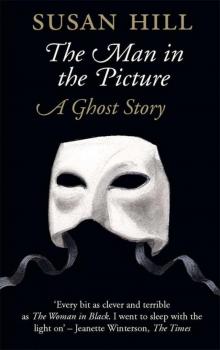 The Man in the Picture
The Man in the Picture Air and Angels
Air and Angels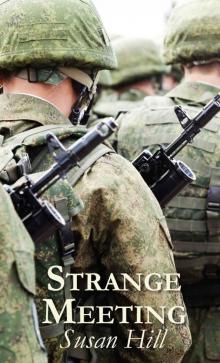 Strange Meeting
Strange Meeting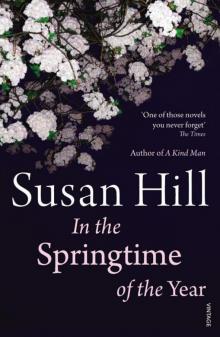 In the Springtime of the Year
In the Springtime of the Year Howards End Is on the Landing: A Year of Reading From Home
Howards End Is on the Landing: A Year of Reading From Home From the Heart
From the Heart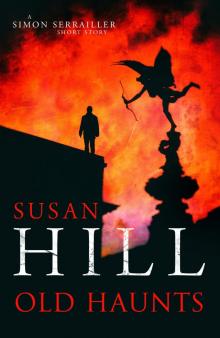 Old Haunts
Old Haunts The Mist in the Mirror
The Mist in the Mirror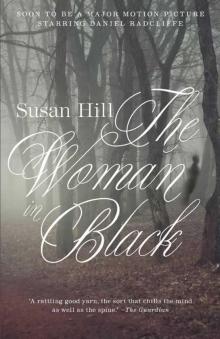 The Woman in Black: A Ghost Story
The Woman in Black: A Ghost Story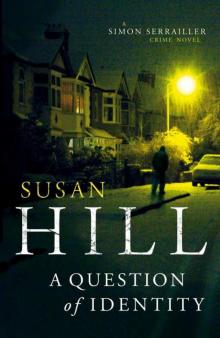 A Question of Identity (Simon Serrailler 7)
A Question of Identity (Simon Serrailler 7)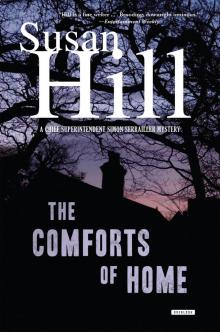 The Comforts of Home
The Comforts of Home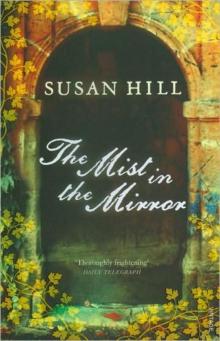 Mist in the Mirror
Mist in the Mirror Jacob's Room is Full of Books
Jacob's Room is Full of Books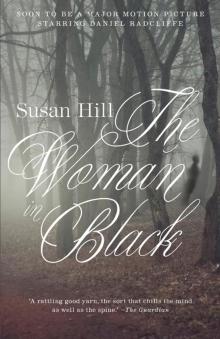 The Woman in Black
The Woman in Black Howards End is on the Landing
Howards End is on the Landing